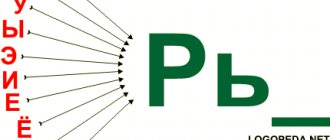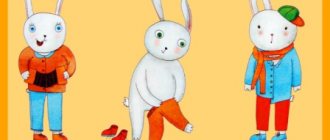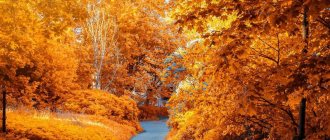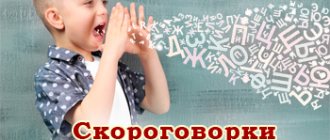Declension of the noun autumn (which case)
Declension of words by case in singular and plural.
| Case | Question | Unit | Mn. number |
| Nominative | (who what?) | autumn | |
| Genitive | (who, what?) | autumn | |
| Dative | (to whom; to what?) | autumn | |
| Accusative | (who, what?) | autumn | |
| Instrumental | (by whom, what?) | in autumn | |
| Prepositional | (About who about what?) | autumn |
Scope of use
Agriculture Americanism Slang Cinema Landscape Design
Connection with other words
Words containing -autumn-:
- snub-nosed
- snub-nosed
- snub-nosed
Words ending with -autumn:
- hair
Hypo-hyperonymic relationships
time season autumn
What is autumn like (adjectives)?
Selection of adjectives for words based on the Russian language.
late early deep golden coming past rainy warm cold last present Boldino Moscow dry first long current dank beautiful next eternal sunny hot clear deaf second soft advancing close Pokrovsk advancing damp quiet slushy military northern wonderful wet whole approaching gloomy short beautiful southern Parisian Siberian windy stormy outgoing new future long bloody protracted school protracted gray famous affectionate yellow dull St. Petersburg rotten post-war
What can autumn do? What can you do with autumn (verbs)?
Selection of verbs for words based on the Russian language.
give out stand come begin change approach enter advance turn out bring end enter give paint go approach go take smile stand shower paint terrify turn look look sigh pass understand go change see near end come stop end return know decide to be silent promise to feel gild bring decorate seem to give to die want to sit down approach grab enter begin carry leave give reach produce come arrive fly
Associations to the word autumn
yard Moscow school Paris city nose forest England mountain army New London village November cottage shore Petersburg street rain window collection break threshold outcome winter life hospital park month beginning evening guide cleaning pole October capital Finland river island house offensive theme hill autumn work Caucasus tree Siberia valley Italy spring hunting Peter swamp the height of the north country Crimea help end Brighton Russia vacation
Antonyms for autumn
spring
Hypernyms for autumn
- it's time for the season
- time period
- year
Scope of use of the word autumn
General vocabulary Proverb Americanism Agriculture Religion
Dictation No. 2 “September” (83 words)
September has arrived. After a sultry summer, golden autumn has arrived. Along the edges of the forests, boletuses and fragrant saffron milk caps still grow. On an old swamp stump, honey mushrooms are huddling together.
Clouds are running across the high blue sky. The swallows and swifts have already flown away. Wild geese are preparing for a long journey, and cranes are leaving their native swamps.
An old elk came out of the forest, raised his head and roared. Early in the morning, the menacing roar of the mighty hero can be heard far away. The moose passed by, made a noise, and scared the hare. He is afraid on clear autumn days. Everything around is yellow and gold, and he is in a white fur coat.
Grammar task:
- Write down two words with unstressed vowels at the root, select test words for them.
- Underline the word that has more sounds than letters.
- Perform a morphemic analysis of the word “roared”.
On the topic: methodological developments, presentations and notes
Didactic games and exercises on the lexical topic “Autumn” for children in the senior speech therapy group.
The presented material will greatly facilitate the speech therapist’s work in planning tasks for the teacher.
Card index of games and exercises on the lexical topic “Spring”
This material may be useful to speech therapists in preschool educational institutions.
Card file of games and exercises on the lexical topic “Mother’s Holiday.”
This material can be useful for speech therapists on the lexical topic “Mother’s Holiday.”
Card file of games and exercises on the lexical topic “Fruit.”
This speech material is intended for speech therapists and group educators compensatory orientation for children with severe speech impairments
Card index of games and exercises on the lexical topic “Fruits.”
This material is intended for speech therapists and teachers of compensatory orientation groups for children with severe speech impairments.
Card index of games, exercises, fiction on the topic “Insects” for senior preschool age.
Card index of games, exercises, fiction on the topic “Pisces” for older preschool age.
Dictation No. 12 “Squirrels in the forest” (116 words)
From morning until late evening, cheerful, nimble squirrels are busy in the forest. You don’t have time to follow their movements at all.
“Mom, I see squirrels!” - exclaimed the joyful baby. And the protein has already disappeared.
Mischievous squirrels will climb to the top of a huge pine tree and jump from branch to branch. Then they will go downstairs for food supplies: tasty mushrooms, selected nuts, dried berries.
These wonderful housewives will hide what they found in the forest storerooms.
They will make warm nests in a cozy hollow house, settle in them, and soon little squirrels will appear in new apartments. They will grow up quickly and be raised by caring parents.
And in the fierce winter, happy families of squirrels will be saved from severe frosts, sharp, cold winds and heavy snowfalls. Live securely in warm, cozy nests.
Grammar task:
- Perform a morphological analysis of the nouns: “snowfalls”, “hostess”.
- Write out two nouns with unstressed endings from the text, determine their declension and case.
- Write out the phrase from the first sentence, determine the role of the noun in it.
Dictation No. 16 “Fog” (131 words)
The evening dawn was burning down. The last rays of the sun snatched tree trunks from the darkness. Fallen leaves rustled softly underfoot.
A huge forest could be seen in the distance. The gloomy trees seemed to stretch out their bare branches towards me. Droplets of evening dew sparkled on the withered grass.
I went out to the edge of the forest and walked along a narrow path through a huge field. It was difficult to walk. The grass clung to my feet and confused my tracks. The ears of ripe wheat rang quietly in the darkness. A night bird rushed past and touched my cheek with its wing.
Fog began to rise from the ground. Thick clouds of milky color enveloped everything around. You can't even see an outstretched hand. How to find the way home?
I continued to walk forward, trying not to stray from the beaten path. Soon the path led me to the outskirts of the village. Through the veil of fog I saw a narrow crescent of the month in the sky. Now I know the way. I'll be home soon.
Grammar task:
- Parse the second sentence.
- Write down two words with alternating vowels at the root of the word.
- Sort out the words according to their composition: burned out, trampled.
Dictation No. 3 “September” (89 words)
Finding a mushroom in September in a colorful carpet of fallen leaves is a difficult task. At this late time there are very few edible mushrooms left. In silence, I slowly wandered through the empty clearings, squinting at the sun and looking under the stumps. Only in the middle of the day did I find a family of cheerful mushrooms. They happily crowded around two roots and looked like mischievous children. I began to carefully cut them and put them in my basket. And from behind a birch tree a real milk mushroom was looking at me! Soon the basket could no longer contain all my loot. I was the luckiest man!
Grammar task:
- Find and write down several words with the spelling “Checkable unstressed vowel at the root of the word.”
- Highlight the morphemes in the word “basket”.
- Write down the exception words from the spelling “Letters i, y, and after sibilants.”
Dictation No. 9 “Autumn in the forest” (112 words)
How beautiful the autumn forest is. The air is fresh and filled with the scent of fallen leaves. Yellow, crimson, purple and orange leaves quietly circle in the air and fall to the ground. Soon a carpet of fallen leaves will cover the clearing and paths in the forest.
Bunches of berries are blazing on rowan branches. This is a favorite delicacy for birds. Sparrows and crows flock to the mountain ash and peck at the juicy, plump berries.
But you can't hear the birds in the forest. Many flew south to warm countries. Ducks and rooks followed the sun. A flock of cranes rushed into the distance like a sharp wedge.
Quiet in the forest. You can only hear a bear cracking its branches in the deadwood bushes. He is looking for the remaining berries on the bushes. Very soon the bear will lie down in its den and fall asleep until spring.
Grammar task:
- Underline the main clauses in the third sentence.
- Make a phonetic analysis of the word “sparrows”.
- Make a morphological analysis of the word “sun”.
Dictation No. 6 “Sounds of the autumn forest” (99 words)
It is quiet and light in the forest on an autumn day. The leaves continue to fall and no longer shade the ground. The wind does not rustle through the crown, the birds do not chirp. They have already flown south. Tree trunks support the sky like columns. A soft carpet of dry leaves is spread between them. Occasionally you come across young oak trees whose leaves have not yet been watered. They flash in the sun in the gaps between the trunks, like torches. And a resounding echo resounds in the forest, as if in a large empty house. In such a forest, every sound can be heard far away. No, no, and a dry branch will crunch, fallen leaves will rustle. Either a hare will slip through, or a fox will carefully make its way among the bushes.
Grammar task:
- Write out three phrases from the second paragraph and analyze them.
- Underline the grammar points in sentences 11 and 12.
- Make a morphemic analysis of the words “heard”, “young”.
Dictation No. 5 “Forest” (99 words)
How beautiful the forest is in autumn! The sun sends farewell rays from the blue sky. The air is fresh. Yellow, orange, crimson leaves quietly fall from the trees and lie on the ground. The silence of the forest is not disturbed by the singing of birds; they have already flown to distant warm countries.
The forest is beautiful on a frosty winter day, when silvery frost sparkles on the tree branches. Loose snow covered all the paths in the forest. You won't pass!
The forest is beautiful in summer too. Herbs and mosses cover the ground with a green carpet, flowers are barely visible from the tall grass. And how cool it is in the summer heat among the dense thickets! It’s good to lie down under a white-trunked birch tree and look for a long time through the branches into the transparent sky.
Grammar task:
- Perform a morphological analysis of the adjective “green”.
- Perform a phonetic analysis of the word “leaves”.
- Break down the word “white-trunked” based on its composition.
Dictation No. 10 “Autumn in the forest” (112 words)
Late autumn has arrived. The weather is stormy. A sharp autumn wind is blowing more and more often. The sun sends farewell rays from the blue sky.
How beautiful the forest is in autumn! The air is fresh. Yellow, orange, crimson leaves quietly fall from black trees and slowly fall to the cold ground.
The silence of the sleeping forest is not disturbed by the singing of birds, because they have flown south. The alleys of the garden became empty and silent. But here in the summer it was so joyful, wonderful! Birds from the surrounding parks flocked here for the festive concert.
In autumn, the forest looks like a painted tower. It’s nice to sit under a white-trunked birch tree and look for a long time at the golden colors of the forest and the purple edge of the sky.
Quiet, cozy. In the vast thickets of the forest you can hide from the autumn wind. The soul is light and calm.
Grammar task:
- Underline the stem in the first and second sentences.
- Write down words with the same root -vod-, analyze them according to their composition.
- Parse the last sentence.
Dictation No. 11 “Hedgehogs are preparing for winter” (114 words)
In late autumn, hedgehogs begin to prepare for hibernation. They have little prey, because lizards, bugs and frogs hide under the snags.
The prickly hedgehog slowly crawls through black hummocks, small clearings, dangerous ravines, past narrow streams.
On wonderful autumn days, the hedgehog tries to prepare himself a wide, warm hole. Day and night he drags fragrant leaves, soft forest moss, dried blades of grass and twigs that he found in the forest into the house. I would like to make sure he has a comfortable bed.
A huge snowdrift covered the hole, and the hedgehog took refuge under such a fluffy blanket. It's good for a happy hedgehog to live in his hole! He sleeps here, has wonderful dreams, and we are happy for him. The hedgehog will wake up in a good mood and then go to inspect his farm.
Grammar task:
- Underline the spelling CHK-CHN.
- Write down words with the same root -hedgehog-, and sort them according to their composition.
- Parse the first sentence.
Dictation No. 1 “Autumn time” (82 words)
October is autumn time. The weather is stormy. Yesterday a sharp cold wind blew. He plucks leaves from trees and spreads them throughout the groves and along the roads. The last birds are flying away. Yesterday the rooks flew away. Before flying away, they circle over the grove for a long time, screaming. At dawn, the rooks sat on the birches, got up and disappeared.
And we have winter guests. Siskins and goldfinches are sitting on a birch tree. Birds peck at tasty birch and alder seeds. Red-breasted bullfinches settled on a rowan tree and pecked at berries. Winter guests will look for food everywhere.
Grammar task:
- Write down three phrases from the first paragraph and analyze them.
- Underline the grammar points in sentences 8 and 9.
- Make a morphemic analysis of the words “delicious”, “fly away”.
Dictation No. 13 “Squirrels” (119 words)
You walk along a forest path, admiring the trees. Suddenly you see a light and agile animal with a bushy tail or hear a sharp clicking sound. These frisky squirrels fearlessly jump from branch to branch. These animals live in forests. There is food for them here: cones, nuts, acorns, berries. In winter, squirrels do not sleep and lead an active lifestyle. In the summer they store food for the winter. There are even dried mushrooms on the squirrel menu. They dry their proteins themselves. Hats are strung on sharp dry twigs or hung on branches. Choose ripe nuts. Squirrels hide all this in moss or in hollows, and in winter they unmistakably find it. A squirrel warehouse can contain several kilograms of delicious food. If you find it, don't rush to use it. After all, the squirrels will be left without food in the winter cold.
Grammar task:
- Perform a morphological analysis of the nouns: “animals”, “mobile”.
- Write out nouns with unstressed endings from the text, determine their declension and case.
- Write out the phrase from the first sentence, determine the role of the noun in the phrase.
Dictation No. 17 “Rowan” (135 words)
Rowan is a real autumn beauty. With the onset of autumn, trees try to get rid of unnecessary leaves and ripe fruits. And the rowan is just beginning to decorate its branches with a scattering of crimson and scarlet fruits. Bittersweet rowan berries are a favorite delicacy of birds.
Rowan grows everywhere: on the outskirts of the forest, on the edge, in a clearing. It also grows near houses. You will often see a spreading crown of rowan in a park or garden.
Rowan likes privacy. She doesn't like dense thickets. So the rowan tree stands proud, majestic and lonely. Although many trees want to be friends with rowan. It's all about the birds. Attracted by the fragrant berries, birds fly in flocks to the tree. In a place with berries, birds peck and there are numerous pests.
Thin rowan branches bend under gusts of wind. But the mountain ash does not give up. Its elastic trunk can withstand even the strongest winds.
Until late autumn, the lovely outfit of the rowan fascinates us. "What a beautiful girl!" – we involuntarily exclaim.
Dictation No. 7 “Autumn Rain” (100 words)
The weather began to change. Low clouds were rushing and approaching from the distant horizon. The sun peeked out from behind the clouds, flashed through the blue gap and disappeared. It got dark. A sharp wind blew. He rustled the reeds, threw dry leaves into the water and drove them down the river. “It will rain,” said Nina.
The wind blows with renewed vigor, wrinkles the surface of the river, and then subsides. The reeds rustled, and circles from the first drops appeared on the water. The river became covered with bubbles as the torrential rain poured down in a continuous line. Valerka shouted loudly: “Let’s run, guys!”
But then the wind died down and the sun appeared. Rare drops of rain fell to the ground. They hung in the grass, and the sun was reflected in every drop.
Grammar task:
- Parse the second sentence.
- Select all prefixes, circle all prepositions.
- Write down two proper nouns. Sort them by composition.
Dictation No. 15 “Pre-winter” (124 words)
The golden autumn died down and cold weather set in. The sun rarely peeks out from behind the clouds and no longer warms the chilled earth. The leaves do not swirl in the air, but lie on the ground. The surroundings can be seen far away through the bare branches. The trees in the forest have darkened from the rain and stand sad. Animals are preparing for a long frosty winter. Squirrels stock up on tasty nuts, mushrooms and edible seeds. The bear had overfed itself over the summer and gained a thick layer of subcutaneous fat. He has winter hibernation ahead of him. It is dangerous to wake up a clubfoot in winter. Hares are waiting for the first snow. With the appearance of snow, they will exchange their summer gray coats for white ones. A hare faces many disasters in the forest, but is saved by his fast legs and sensitive ears. Kosoy senses danger well and does not let foxes and wolves get close to him. Soon the fields and forests will turn white, and winter will displace autumn.
Grammar task:
- Find and write down a few words with the spelling “Dividing ъ and ь”. Illustrate spellings graphically.
- Highlight the morphemes in the word “animals”.
- Remember and write down 5 words with unverifiable vowels and consonants.
Dictation No. 4 “Summer is ending” (92 words)
Summer is ending. The fires of leaf fall are getting brighter and brighter. Autumn painted the birch and maple trees yellow, and the leaves of the aspen trees turned red. She went to the forests, to the fields, to the meadows, removed the golden grain from the fields, and in the meadows swept the fragrant haystacks into tall stacks.
Schools of birds rose into the sky: cranes, ducks, geese. Here, just under the clouds, large white birds fly and send farewell greetings to their native places. "Goodbye, birds!" — people see them off.
Autumn is in a hurry, in a hurry. The motley collection of leaves is washed away by the cold rain. The sun came out from behind a cloud, and under its gentle rays the gloomy picture of autumn changed.
Grammar task:
- Write out two verbs of the first conjugation from the text, conduct a morphological analysis.
- Write down two verbs of the second conjugation.
- Write down words with alternating vowels in the root and analyze them morphemically.









